P. P. Ramachandran | |
|---|---|
 | |
| Born | 1962 (age 61–62) Vattamkulam, Malappuram, Kerala, India |
| Occupation | Poet, author, teacher |
| Website | |
| Website | |
P. P. Ramachandran is a Malayalam poet.
P. P. Ramachandran | |
|---|---|
 | |
| Born | 1962 (age 61–62) Vattamkulam, Malappuram, Kerala, India |
| Occupation | Poet, author, teacher |
| Website | |
| Website | |
P. P. Ramachandran is a Malayalam poet.
His poems are collected in two books, Kanekkane (Thrissur: Current Books) and Rantay Murichathu (Cut into Two) (Thrissur: Current Books).
His collection Kanekkane won the Kerala Sahitya Akademi Award for Poetry in the year 2003. [1] Katte Kadale won the P. Kunhiraman Nair Poetry Award in 2013. He received the Cherusseri Award in 2014. [2] He has also received awards established in memory of V. T. Kumaran (1991), [3] Cherukad (1995), Kunjupillai, Changampuzha and V. K. Unnikrishnan.
He is a high school teacher in A.V. High School, Ponnani. He lives in Vattamkulam, a small town in Malappuram district.

Vayalar Ramavarma, also known as Vayalar, was an Indian poet and lyricist of Malayalam language. He was known for his poems which include Sargasangeetham, Mulankaadu, Padamudrakal, Aayisha and Oru Judas janikkunnu and for around 1,300 songs he penned for 256 Malayalam films. He received the National Film Award for Best Lyrics in 1972 and was the winner of the Kerala State Film Award for Best Lyricist in its year of inception which he received three more times. He was also a recipient of the Kerala Sahitya Akademi Award for Poetry in 1962. His collaborations with G. Devarajan produced the golden era of Malayalam film music and many songs written and composed by these duo remain the ever green classics in Malayalam. Ramavarma is regarded as one of the most successful and critically acclaimed lyricist in the history of Malayalam cinema.
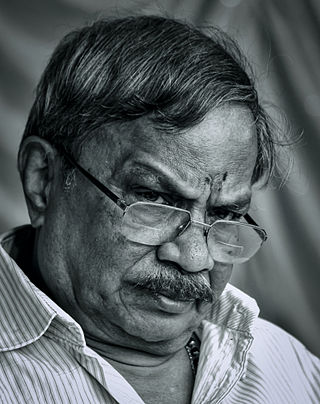
Madath Thekkepaattu Vasudevan Nair, popularly known as M.T., is an Indian author, screenplay writer and film director. He is a prolific and versatile writer in modern Malayalam literature, and is one of the masters of post-Independence Indian literature. At the age of 20, as a chemistry undergraduate, he won the prize for the best short story in Malayalam at World Short Story Competition conducted by The New York Herald Tribune. His first major novel Naalukettu, written at the age of 23, won the Kerala Sahitya Akademi Award in 1958. His other novels include Manju (Mist), Kaalam (Time), Asuravithu and Randamoozham. The deep emotional experiences of his early days have gone into the making of MT's novels. Most of his works are oriented towards the basic Malayalam family structure and culture and many of them were path-breaking in the history of Malayalam literature. His three seminal novels on life in the matriarchal family in Kerala are Naalukettu, Asuravithu, and Kaalam. Randamoozham, which retells the story of the Mahabharatha from the point of view of Bhimasena, is widely credited as his masterpiece.

Koloth Thattarath Sukumaran, popularly known as Sukumar Azhikode was an Indian academic, orator, critic and writer of Malayalam literature, known for his contributions to Malayalam language and insights on Indian philosophy. He was a scholar in Sanskrit, Malayalam, and English languages and his work, Tatvamasi, published in 1984, is a notable work for its detailed interpretation of Indian philosophy, Vedas and Upanishads. He was a recipient of several honours including Sahitya Akademi Award, Kerala Sahithya Akademi Award, Vayalar Award, Vallathol Award and Ezhuthachan Puraskaram, the highest literary award of the Government of Kerala. The Government of India awarded him the fourth highest civilian honour of the Padma Shri in 2007, which he refused citing the award was a discrimination.

Thakazhi Sivasankara Pillai, popularly known as Thakazhi after his place of birth, was an Indian novelist and short story writer of Malayalam literature. He wrote over 30 novels and novellas and over 600 short stories focusing on the lives of the oppressed classes. Known for his works such as Kayar and Chemmeen, Pillai was a recipient of the Padma Bhushan, the third highest Indian civilian award. He was also a recipient of the Jnanpith Award, India's highest literary award, awarded in 1984 for the novel Kayar.

Vyloppilli Sreedhara Menon was an Indian poet of Malayalam literature. Known for his works such as Kudiyozhikkal, Kannikkoythu and Mambazham, Menon was the founder president of the Purogamana Kala Sahitya Sangham, an organisation of Kerala-based artists, writers and art and literature enthusiasts. He was a recipient of several honours including Sahitya Akademi Award, Kerala Sahitya Akademi Award for Poetry, Vayalar Award and Odakkuzhal Award.

Parutholli Chalappurathu Kuttikrishnan, popularly known by his pen name Uroob was an Indian writer of Malayalam literature. Along with Basheer, Thakazhi, Kesavadev, and Pottekkatt, Uroob was counted among the progressive writers in Malayalam during the twentieth century. He was known for his novels such as Sundarikalum Sundaranmarum and Ummachu, short stories like Rachiyamma and the screenplays of a number of Malayalam films including Neelakuyil, the first Malayalam feature film to receive the National Film Award. He was a recipient of several honours including Kendra Sahithya Academy Award and the inaugural Kerala Sahitya Akademi Award for Novel.

Attoor Ravi Varma was an Indian poet and translator of Malayalam literature. One of the pioneers of modern Malayalam poetry, Ravi Varma is a recipient of Kendra Sahitya Akademi Award, Kerala Sahitya Akademi Award for Poetry and Kerala Sahitya Akademi Award for Translation, besides many other honours. The Government of Kerala honoured him with their highest literary award, the Ezhuthachan Puraskaram, in 2012 and the Kerala Sahitya Akademi inducted him as their distinguished fellow in 2017.

Manoj Kuroor is an Indian poet, novelist and lyricist who writes in Malayalam.
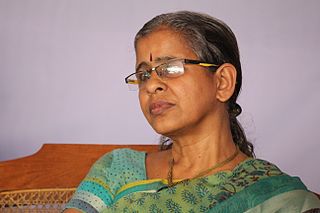
V. M. Girija is an Indian poet and essayist, writing in Malayalam language. She has published a number of books, which include Prem - Ek Album, the Hindi translation of her poetry anthology in Malayalam, Pranayam Oralbum. Kerala Sahithya Akademi awarded her their 2018 annual award for poetry and she is a recipient of 'Changmpuzha Award for literature', 'Basheer Amma Malayalam Puraskaram', and Asan Smaraka Kavitha Puraskaram.

Panayanthitta Kunhiraman Nair, also known as Mahakavi P, was an Indian writer of Malayalam literature. He was known for his romantic poems which detailed the natural beauty of his home state of Kerala in South India as well as the realities of his life and times. He received the inaugural Kerala Sahitya Akademi Award for Poetry in 1959. He was also a recipient of the Sahitya Akademi Award.
N. P. Mohammed, popularly known by his initials N. P., was an Indian novelist, short story writer and screenwriter of Malayalam language. Along with his contemporaries like M. T. Vasudevan Nair, O. V. Vijayan, Kakkanadan, and Madhavikutty, he was known to have been one of the pioneers of modernist movement in Malayalam fiction. He was the president of Kerala Sahitya Akademi and a recipient of several awards including Kendra Sahitya Akademi Award, Kerala Sahitya Akademi Award for Story, Kerala Sahitya Akademi Award for Novel, Lalithambika Antharjanam Award, Padmaprabha Literary Award and the Muttathu Varkey Award.
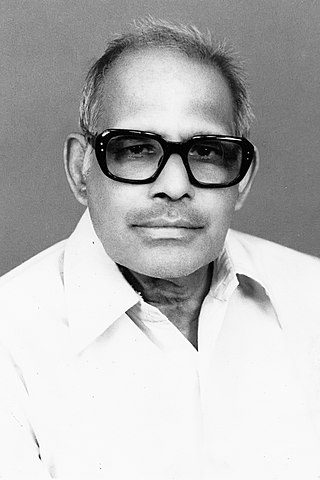
Olappamanna Mana Subramanian Namboothirippad, better identified by his family name, Olappamanna , was an Indian poet of Malayalam literature. A former chairman of Kerala Kalamandalam and an author of 20 books of poetry, his poems were noted for their explicit social expressions. He received two awards from Kerala Sahitya Academy and another from Kendra Sahitya Academy, besides honours such as Government of Madras Poetry Prize, Odakkuzhal Award, N. V. Puraskaram, Asan Smaraka Kavitha Puraskaram and Ulloor Award.
Sankara Pillai Guptan Nair or S. Guptan Nair was an Indian scholar, academic, critic and writer of Malayalam literature.
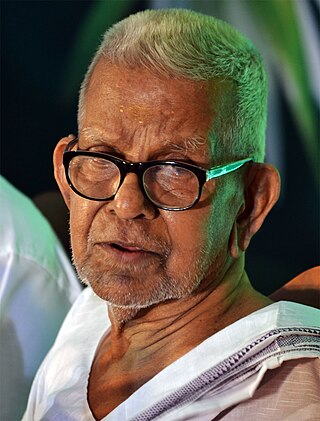
Akkitham Achuthan Namboothiri, popularly known as Akkitham, was an Indian poet and essayist who wrote in Malayalam. He was known for a simple and lucid style of writing, exploring themes of profound love and compassion in his works. Some of his prominent works included Irupatham Noottandinte Ithihasam, Balidarshanam, and Nimisha Kshetram.

Narayanan Nambuthiri Kakkad, commonly known as N. N. Kakkad, was an Indian poet of the Malayalam language. Known for works such as Saphalmee Yathra, Pathalathinde Muzhakkam and Changatham, he was a Sanskrit scholar and was known to have been proficient in painting and music. He was a recipient of several awards including Odakkuzhal Award, Asan Smaraka Kavitha Puraskaram, Kerala Sahitya Akademi Award for Poetry and Vayalar Award.
Chandrika Balan is an Indian writer who has published books in English and Malayalam, under the pen name Chandramathi, ചന്ദ്രമതി in Malayalam. She is a writer of fiction, a translator, and critic in English and Malayalam. Chandramathi has published four books in English and 20 in Malayalam, including 12 collections of short stories, an anthology of medieval Malayalam poetry, two collections of essays, two memoirs, and five books translated from English. The Malayalam film Njandukalude Nattil Oridavela was based on her book.
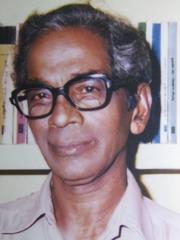
Vadakke Valath Krishnan, commonly known as V. V. K. Valath, was an Indian writer, poet, toponymist and historian of Malayalam language. One of the pioneers of toponymy in Kerala, he focused on the origin of place names in the state as the subject of his works which are known for their attention to historic detail. He wrote poems, short-stories, novels, and over 400 historical articles and his most notable works are Rigvedathilude, Keralathile Stalacharitrangal, and poetry anthologies, Idimuzhakkam and Minnal Velicham. Kerala Sahitya Akademi awarded him their annual award for overall contributions in 1999. He was also a fellow of the Place Names Society and a recipient of the Pandit Karuppan Award.

Ezhacherry Ramachandran is a Malayalam poet, lyricist and journalist. He has penned lyrics for several Malayalam movies and albums. In 2020, he won the Vayalar Award.
R. Ramachandran (1923–2005) was a Malayalam–language poet from Kerala state, South India.

T. V. Kochubava (1955–1999) was an Indian writer of Malayalam literature, known for his novels and short stories. He published twenty three books covering the genres of novels, short stories, translations and plays and was a recipient of a number of awards including the Kerala Sahitya Akademi Award for Novel in 1996, besides several other honours.